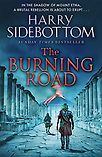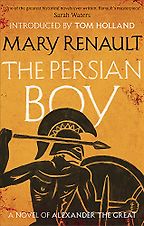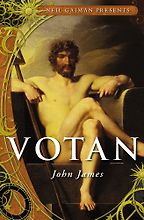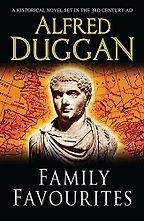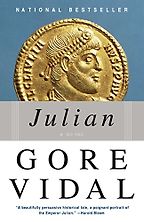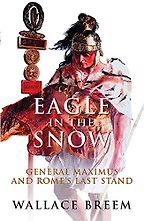Before we discuss the works of historical fiction set in the ancient world that you’ve recommended, I was going to ask you what makes a good historical novel. You’ve got to get people back in time, in a convincing way, and there are all sorts of ways of doing that. But maybe a more interesting question is what the absolute ‘mustn’t dos’ are. Is the use of archaic speech, for instance, a no-no? Or do some people do that very well?
No, they don’t. I think there’s a whole frightening list of mustn’t-do things for writing a historical novel. The first failure would be just not doing enough research and getting the basic things wrong. When I say the basic things, I mean the externals: clothes, food, weapons. If you get those wrong and dates wrong, it shatters the reader’s illusion of the novelist’s mastery over what they’re doing.
What really irritates me is—and it’s quite a big trend in modern historical fiction, and especially in modern historical fiction set in the classical world—is making no allowances for the mentalities and attitudes and values of another culture being different from ours. We end up with novels where a perfectly modern person with all our Western liberal attitudes and values ends up wearing a toga. It really, really grates with me. I think it’s insulting, both to us and to the past. You know the famous cliché: ‘The past is a foreign country: they do things differently there.’ People in the past didn’t have our attitudes to violence, women, foreigners, sex—you name it.
Yes, they’re often similar to us but, at the same time, they’re as alien as a tribe in the Amazonian jungle. Anachronistic thinking is the thing that really grinds my gears, and it’s the thing I come across more and more. I think most novelists now do make an effort to get the externals right and, on the whole, they do get them right. It’s the mentalité they get totally wrong. I think that’s one of the biggest no-nos, for me.
That’s very interesting. I can imagine there could be quite a lot of pressure on novelists to ensure that they don’t frighten the modern horses too much by talking in unwoke terms about all those things you just mentioned.
Absolutely. The whole woke debate about whether a novelist can ever write through the point of view of someone else threatens to destroy historical fiction entirely. I wouldn’t have written a single novel because I’m not a Roman, I’m not a Greek, I’m certainly not a Germanic barbarian who’s become Romanized. I’m none of these things. I’ve written from points of view of women, of men, people of a different sexuality to me, and those of a different religion—I was just pausing there because actually, I’m an atheist. I can’t remember whether I’ve had any atheist characters in my books yet.
For a polytheist, it would have been a slightly bizarre term.
We’ll be talking about Gore Vidal’s Julian. Pagans regarded Christians as atheists because they denied that there were any gods but their one.
Let’s get into the books. The first historical novel set in ancient times that you’ve chosen to recommend is The Persian Boy by Mary Renault.
I’ve put them not in order of date of publication, but in chronology of when they were set. The Persian Boy by Mary Renault is the earliest. Looking at them now it strikes me that they were all published in quite a narrow window between 1960 and 1972, with Mary Renault the last to be published. It was obviously a golden age of fiction, but that wasn’t in my thinking at all when I picked them.
So, this one is set in the time of Alexander the Great.
The Persian Boy is the story of the last seven years of Alexander the Great’s life. It’s told through the eyes of Bagoas, the Persian boy. What it does superbly well, and makes it stand out from almost any other historical novel, is the way it recreates not just one ancient culture, but two, because you’ve got the Macedonians viewed through the eyes of a Persian. It works. Both are utterly convincing. It’s also an incredibly clever technical device, and one from which I’ve learned an awful lot. Because Bagoas, the Persian boy, is a eunuch, and a concubine at first of the Persian king’s and then of Alexander’s, he’s an outsider to the Macedonians. So the Macedonians are strange to him. The things they do make him think, and he comments on them. It’s an incredibly clever device. What happens all too much in historical fiction is that you have two Romans, they’re both Roman senators, they walk out of the senate house and then, in the fiction, they turn to each other and explain in great detail how the Roman Republic works. But they would have already known how it works: why do they say it? Having this device of the outsider as a main character gives the novelist the chance to actually tell the reader things and show the reader things without it seeming laboured and forced and never veering into the dreaded ‘info dump’, which often crops up.
“They’re often similar to us but, at the same time, they’re as alien as a tribe in the Amazonian jungle”
Another fascinating thing about The Persian Boy is her hero. Bagoas is a eunuch. He’s had a very bad life. He is a concubine of two kings. He’s the antithesis of the traditional hero of a historical novel. He’s not brave, he doesn’t have a great sense of justice. He’s actually rather cowardly, rather sneaky. He is, in many ways, not a terribly likeable person. But somehow Renault manages to make him intensely sympathetic to the reader. It’s not just because he’s had such a bad start to his life. He does have redeeming qualities: his loyalty and his love for Alexander make up for all the scheming, the plotting and the weakness. So I think that’s another great strength of this book.
I’ve read this book twice, first when I was a schoolboy at an English public school. I found it quite disturbing because it was the first book I’d ever read that dealt with male-male sexuality. And published in 1972—I mean, back then, to be openly gay was a very rare choice and a very brave thing to do. So I think now we have to remember that this was a very daring novel. It explores sexuality. This is something the classical world is very good for. A lot of fiction has used the ancient world to explore contemporary issues of sexuality—but through the lens of Greece or Rome, not Macedonia or Persia. That’s another thing that makes this book stand out.
Let’s move on to John James’s novel, Votan.
For me, Votan, published in 1966, is an object lesson of how the quality of a book has absolutely no bearing on its success whatsoever. John Jones is a brilliant writer, I think Votan is a great book—and it is completely and utterly forgotten. I’ve only ever seen one living writer mention John James, which oddly enough was Neil Gaiman, who absolutely raves about him. But apart from Neil Gaiman and me, it seems no one in the world reads John James anymore.
In what period of ancient history is the novel set?
Votan is a novel about a Greek merchant called Photinus, who travels outside the Roman Empire sometime in the Antonine peace, probably late first, early second century AD. He travels into Germany and north to the Baltic. It’s an adventure novel. What’s very clever about it is that the adventures that Photinus has form the nucleus of the Norse sagas. In a sense, he becomes Votan (or Woden) the All-Father, and his settlement becomes Asgard. What happened to it becomes Ragnarök, the death of the gods. There is an incredibly clever literary play with the Norse sagas going on throughout this book. Now for me, as a historian, this smacks of The Golden Bough by James George Frazer or Robert Graves’s Greek Myths, that searching of every myth for a kernel of real historical truth. That couldn’t be less fashionable in modern scholarship. In a way, I ought to absolutely loathe this book, but I don’t, I love it because it’s so exciting and so well written.
There’s one other thing to draw out about this book. Like Mary Renault, James manages to recreate an alien thought world, but he does it in a different way. With Mary Renault, you get that brilliant layering and texturing of historical detail that reminds me of Patrick O’Brian and his Jack Aubrey and Steven Maturin novels, that building up of a believable world with layer after layer, detail after detail. John James in Votan doesn’t do that. What he does is a more broad-brush approach where everything is just like us, but slightly offset and strange. It works really, really well.
Next up is Family Favourites by Alfred Duggan. What’s the ancient historical context for this novel?
It’s a novel about the Roman emperor Heliogabalus. He’s viewed through the eyes of a fairly staid, fairly conventional Gallic Roman nobleman. This is one of the very few books that actually changed my life. I read it when I was an undergraduate. It’s the first time I’d ever heard of the emperor Heliogabalus, also known as Elagabalus. I became fascinated by him and actually did my master’s thesis on him. I then applied to Cambridge and Oxford to do my doctorate on him. At that point, writing a biography was very unfashionable in academe, so I ended up writing about the sources that wrote about him instead of about him. But I’m just finishing a book with the not-at-all-shouty title of The Mad Emperor Heliogabalus and the Decadence of Rome. My original working title was Sex and Death: Heliogabalus and the Decadence of Rome, but my publisher changed it.
Get the weekly Five Books newsletter
So this is a book that really interested me in a period of history that otherwise I wouldn’t have known. What’s so good about this novel—and, indeed, all Alfred Duggan’s novels, he wrote an awful lot of them, nonfiction too—is that although he didn’t really engage all that much with contemporary scholarship, he did read all the primary sources and thought about them. That really shines through at the level of day-to-day life. It’s a theme I keep going back to, the attitudes and mentalities of the characters. He somehow recreates them in a believable way, even though they are sometimes a little Christian—Duggan himself was a very devout Catholic, a convert. There is a sort of morality and a duty to his characters, but he managed to shape that into the morality and duty of the times he writes about.
It’s also interesting because Alfred Duggan when he was in his heyday was a genre novelist, but he wrote so well that lots and lots of literary novelists admired him enormously, including Evelyn Waugh. He’s one of those novelists, a bit like Mary Renault or Patrick O’Brian, who stopped being regarded as a genre novelist in that slightly dismissive way and was just thought of as a novelist.
He was a friend of Evelyn Waugh’s.
Yes he was part of what is now called the ‘Brideshead set’.
Historically, what was remarkable about Heliogabalus?
Heliogabalus was a 13- or 14-year-old boy from a Syrian family when, in AD218, his grandmother engineered a civil war that put him on the throne. She clearly wanted him to be a puppet ruler. She’s an elderly woman. She’s lived at the imperial court for almost half a century, and she wanted someone to rule through. Unfortunately, her grandson wasn’t that amenable. He was an absolute devotee of a Syrian god called Elagabal, and he ignored every duty of being Roman emperor in favour of worshipping his god, which was a huge black stone. He carted it all the way from what is now Homs to Rome. He installed it at the head of the Roman pantheon and married a vestal virgin. He offended traditional Roman and religious sentiment in every way he could. If there was a social barrier, a no-no, he went ahead and did it, whether in religion, in politics, or sexuality. He was an extraordinary figure and he makes a great lens through which to view the Romans. You can almost work out what normal Roman attitudes to anything were by looking at what Heliogabalus did—and it will be the opposite. He’s fascinating.
Now, for some of the wilder fringes of the LGBTQ+ community, he has become something of an icon. That only really works if you concentrate on his sexuality and the fact he may have wanted a sex change—and ignore the fact that he was massively irresponsible and exceedingly violent.
Which of these aspects appealed to Alfred Duggan as a devout Catholic?
It’s hard to say. Duggan was very influenced by the late 19th century Decadent movement, which had already reclaimed Heliogabalus, not as a perverted madman or religious nutter, but as the ultimate aesthete. I think it was that that really caught Duggan’s attention, especially as he moved in Harold Acton’s aesthetic set in Oxford.
Let’s move on to Gore Vidal, who was a prolific writer and not just of historical fiction. Tell me about Julian.
Gore Vidal’s Julian is, unsurprisingly, about the Roman emperor Julian the Apostate. Julian was emperor from 361 to 363 AD and attempted to turn the empire back from Christianity to paganism. It is very much a literary novel. It has quite a complex structure whereby it starts with letters between Libanius and Priscus—two real pagan intellectuals—who write to each other about Julian after the emperor’s death. Then it shifts into a manuscript that one of them has miraculously got in Julian’s own words, which takes us up to Julian’s death. Then it shifts back to the two men writing to each other.
I think its key theme is the impact of Christianity and, in many ways, it is a deeply anti-Christian novel. At the heart of that is a protest against the way Christianity altered the sexuality of the ancient world, not just with its antipathy to homosexuality, but its loathing of the body and sex. That’s the core of the novel.
It’s a very rare novel because what we’ve got here is a very established literary novelist turning out a historical novel set in the ancient world. Usually, when this happens, the result is absolutely awful because the literary novelist already sees themself as an established commentator on the human condition, so doesn’t feel the need to actually bother to do any work and get anything right. They also almost always, like the worst of genre novelists, fall into the trap of assuming their characters—in this case Romans—were just like them. There are endless examples of this, which Gore Vidal managed to avoid. He was keenly intelligent and had enough empathy to realise the people he was writing about weren’t just Gore Vidal dressed up in Roman costume.
Let’s go on to Wallace Breem’s Eagle in the Snow.
This is the most lowbrow of the five novels I’ve picked. It really is a genre novel. I tend to dislike and dismiss the concept of genre. I’m always quoting John Banville, the Booker Prize winner, who was once criticised for writing detective stories. He said that genre doesn’t exist; there’s just good writing and bad writing. But Wallace Breem was a genre writer. His story is about a man called Maximus—by the way, there are far too many characters in ancient historical fiction called Maximus: I know, I’ve done it myself once or twice.
I was wondering whether this novel had been the basis for the film Gladiator with Russell Crowe, where he’s called Maximus.
Worryingly enough, the germ of the idea for Gladiator came from a novel called Those About to Die by Daniel P. Mannix. It is widely regarded as being the worst novel ever written set in the ancient world. It is abysmally bad. Its opening paragraph has the Roman Empire “coming apart like an unraveling sweater.”
In Eagle in the Snow, Maximus, a Roman general who’s a pagan, is given the impossible task of defending the Rhine frontier with just one legion against six German tribes. It’s a novel that is full of historical mistakes. For example, a real legion at that time would have had 1,000 men. His legion has 6,000. A lot of their kit is wrong. He didn’t get the real externals right at all. And I’m not 100% sure he even made much of an effort to get the internals right, beyond making his hero a pagan, and putting him in the tricky position of defending a Christian empire.
“A lot of fiction has used the ancient world to explore contemporary issues of sexuality”
But what is so good about Wallace Breem’s Eagle in the Snow is the action sequences. He wrote really good battle scenes. And, although his main character may be a bit anachronistic, he’s interesting and conflicted. He’s a man who is the archetype for all sorts of later heroes in historical fiction. He’s a man going to do his duty even though he really, really doesn’t want to.
I read it when I was a child and I loved it. It had a huge impact on me and turned me on to historical fiction. All these years later, I think it probably had even more of an influence on me than I realised, in that the portrait of the hero, Maximus in Eagle in the Snow, this man who is forced to be the hero when he doesn’t want to be, might well, unconsciously, underpin quite a bit of my hero Ballista, who has featured in eight of my novels so far. Once you’ve written a few novels, you look back on things and you have a different perspective. Now and then you think, ‘Blimey, so maybe that’s where that came from, not my native, staggering genius!’
That’s a very good reason for picking the book. And is writing good action scenes as hard as writing good sex scenes?
I love writing action sequences. They do pose a huge technical challenge. I don’t want to generalise for what every novelist does or should do, but what I do is I tend to plan out the action sequence very carefully. I choreograph it with maps and bits of cardboard, moving them around to make sure that the characters physically can see and hear what I’m claiming they can see and hear. If it’s a hand-to-hand fight, then—yes, I’m a sad geek—I have replica swords, and I will actually check if it is physically possible to move from position A to position B in one fluid movement. But once you’ve done all this very careful planning to make sure it works, I find it best to write it really quickly, to try and get some pace into the narrative.
Five Books interviews are expensive to produce. If you're enjoying this interview, please support us by donating a small amount.
Sex scenes, on the other hand, are hideously difficult to write. I received criticism of my first novel Fire in the East that there wasn’t enough sex in it, so in my second novel, King of Kings, I tried to put a couple of pretty adult, raunchy sex scenes in. My editor’s comment in the margin on the first one was just ‘Errr.’ His comment on the second one was, ‘Harry, I’m worried by your gathering obsession with writing Carry on Bonking scenes.’ You’re treading a fine line between writing pornography and toppling over into a Carry On comedy.
I didn’t have any problem with my mother or any of my relatives or students reading them. Having said that, it is amazing how some readers assume that all sex scenes are ultimately autobiographical. There’s an element of ‘Oh that’s what you like to do!’ No, it’s what an imaginary character I’ve made up would like to do! No one does the same with the violent scenes, assuming that I actually stalk the back streets of Oxford with a bladed weapon, looking to mutilate people.
There is something inherently voyeuristic about it. It’s difficult to convey intimacy because, in the normal world, you wouldn’t be watching it. So it always feels a bit like pornography.
That’s one of the differences between us nice, modern, Western, not-as-repressed-as-we-used-to-be in our Judaeo-Christian way people and the Romans. A Roman house was full of other people who weren’t your family. There’s an awful lot of Roman art that shows a perfectly loving couple having sex on a bed and there’s a servant happily standing by with the drinks. It’s extraordinary to our way of thinking and, presumably, isn’t just an artistic convention. It presumably did reflect their lives, that slaves were so unimportant you could have sex with your partner in front of them, and who cares what they think or if they’re even there—which is mind-blowing, really.
Five Books aims to keep its book recommendations and interviews up to date. If you are the interviewee and would like to update your choice of books (or even just what you say about them) please email us at [email protected]

